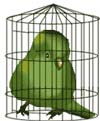
 The Animal Protection
Institute (API) in coordination with the Avian Welfare Coalition (AWC)
is calling on activists around the U.S. to take action on behalf of
captive birds by drawing attention to the exploitation of other
country's native birds by the U.S. pet industry on January 5 -- National
Bird Day. The Animal Protection
Institute (API) in coordination with the Avian Welfare Coalition (AWC)
is calling on activists around the U.S. to take action on behalf of
captive birds by drawing attention to the exploitation of other
country's native birds by the U.S. pet industry on January 5 -- National
Bird Day.
"National Bird Day" is not only a good day to take time to appreciate
the native wild birds flying free outside our windows, it is also a
perfect time to reflect on how we treat the native birds of other
countries. While we have enacted laws to protect our native birds --
such as blue jays, cardinals, and crows -- from commercial exploitation,
we fail to recognize the inconsistency in allowing the pet industry to
exploit the birds of other countries.
Even when bred in captivity, exotic birds are not considered
domesticated animals, and all their inherent behavioral and physical
needs remain intact. Sadly, when it comes to birds, deprivation of their
natural behaviors (to fly and flock, for example) is an inescapable
component of their captivity.
Each year thousands of birds are sold into the pet trade to
individuals who are under the mistaken impression that a bird will make
a perfect pet. Eventually, whether due to frustration, disinterest, or
concern, many people attempt to rid themselves of the responsibility of
caring for their birds. Unfortunately, few of these birds will find a
loving home, and most will spend their days isolated and confined to
their cages. Others will bounce from home to home as their caretakers
tire of them, and some may be abandoned at local shelters and birds
rescues, set free to fend for themselves or euthanized.
Meanwhile pet stores across the country, including Petco and
PetsMart, continue to treat birds like merchandise peddling them into
the pet trade. Pet stores that sell live animals are routinely faced
with conflicting responsibilities between caring for the health and
well-being of the animals and protecting the store's bottom line. More
often than not it's the bottom line that prevails.
You Can Help
Join API and the Avian Welfare Coalition in its second annual
National Day of Action for Captive birds by helping to educate the
public about issues affecting captive birds and by asking Petco and
PetsMart not to sell live birds in their stores.
There are many ways you can participate:
- Hold a peaceful protest and leaflet in front of a Petco or
PetsMart to educate their customers on why they should not support
Petco or PetsMart so long as they continue to sell birds. Or drive to
your local Petco and PetsMart stores and place flyers on the
windshields of cars parked in the parking lot.
- Write letters to Petco and PETsMART and let them know why you
won't patronize their stores. Sample letter and contact information
available at www.api4animals.org/317.htm.
- Send a letter to the editor or Op-ed drawing attention to the
plight of captive exotic birds in this country. Sample letters
available at www.api4animals.org/1391.htm and
www.api4animals.org/1392.htm.
- Set up an educational display. Community centers and local or
school libraries often have exhibit cases that can be used for
educational displays. Just ask the manager or librarian how to make a
reservation and be willing to agree to some guidelines.
- Host a video showing. A video showing can consist of close friends
or family members viewing a video at home or reserving a classroom
with a standard television or big screen for the public.
- Give a presentation at a school, children's museums, boy's and
girl's club, or library. Ask the kids to draw or write on the theme
"Born to be Wild," comparing and contrasting our native birds to the
native birds of other countries, comparing and contrasting how birds
live in the wild and how they live in captivity, or how the wild bird
trade impacts birds. For more ideas for kids visit
http://craftsforkids.about.com/library/spdays/bljan5th.htm.
Three videos are available from AWC members:
- "Stalking the Wild Amazons." Harvard biologist
Mike Schindlinger introduces the parrots he studies as they move
through their daily lives with an intelligence not dissimilar to our
own. VHS 1 hour: Cost $29.95. Visit
www.sneakerfish.com/parrots/.
- "The Fire and the Wings." Mary Margison, Media
Presentation Coordinator, Foster Parrots Ltd, documents the challenges
faced by bird rescues and the reasons captive birds become homeless.
VHS 29 min: Free. Contact Mary Margison at
Marymary81@aol.com.
- "Wild at Heart." The Animal Protection Institute
(API) examines the impacts of the pet trade on exotic birds in
captivity and in the wild and offers ways to help. VHS 15 min. Free.
Contact API's Monica Engebretson at
monica@api4animals.org.
Let us know your plans!
We would like to compile a list of activities complete with contact
information so that interested people team up to participate in planned
leafleting and tabling events in their area. So once you have decided
what you want to do, email Monica Engebretson at
monica@api4animals.org so we
can add your action to our list of participants and activities. If you
get a letter to the editor published in a newspaper, please let us know
and send a copy if possible to API, P.O. Box 22505, Sacramento, CA
95822.
Posted 09/09/03
Home |
About Us | Join API |
Action Alerts
Campaigns & Programs | Wildlife
Campaigns | Legislation
API's Primate Sanctuary |
Publications | Media
Site Map | Join Our Action
Alert Team | Donate Now
Copyright © 2001, 2002, 2003 Animal Protection Institute. All rights
reserved.
|

